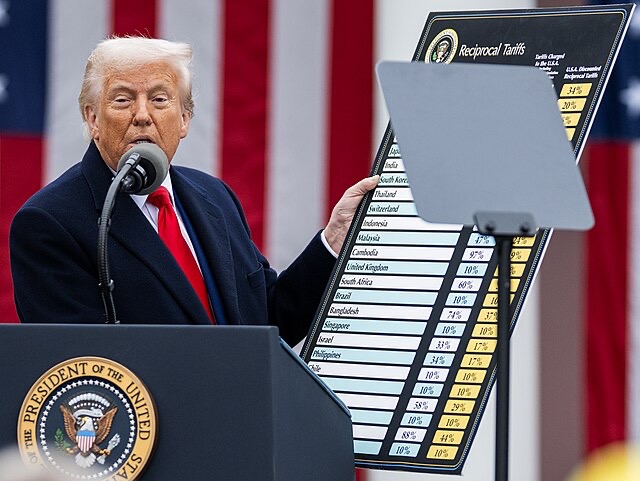In a move that’s sending shockwaves through global markets and rattling the nerves of international trade officials, former U.S. President Donald Trump has called for a sweeping 50% tariff on all goods imported from the European Union. The announcement, delivered on his Truth Social platform, marks a significant escalation in the already tense trade relationship between the United States and Europe.
The proposed tariff, scheduled to take effect on June 1, 2025, comes amid claims by Trump that the EU has consistently taken advantage of the U.S. in trade negotiations. The bold declaration has already sent financial markets tumbling and sparked urgent discussions among global trade leaders.
Trump’s Statement: Targeting the EU Trade Surplus
Trump’s fiery rhetoric returned with full force as he accused the European Union of undermining American economic interests. The European Union, which was formed for the primary purpose of taking advantage of the United States on TRADE, has been very difficult to deal with. Our discussions with them are going nowhere!” Trump posted.
He announced that unless a new agreement was reached, a 50% tariff would be levied on all EU imports starting June 1. The former president claims this measure is necessary to rebalance trade, reduce the deficit, and protect American jobs and industries from what he sees as unfair competition.
Markets React: Immediate Financial Shockwaves
The financial repercussions were swift and sharp. U.S. stock market futures plummeted, with Dow Jones futures falling over 600 points, Nasdaq dropping nearly 400 points, and S&P 500 futures seeing a steep decline. The European DAX index also slipped by 1.85%, reflecting deep investor anxiety over the possibility of a trade war.
Tech giants took a particularly hard hit. Apple shares plunged over 4% in pre-market trading following Trump’s additional threat to impose a 25% tariff on iPhones not manufactured in the U.S. This directly targets Apple’s increasing reliance on overseas production, particularly its move to expand manufacturing in India.
Gold prices rose and Treasury yields dipped, a classic sign of investors fleeing to safer assets amid fears of global economic instability.
Potential Economic Fallout
A 50% tariff on EU goods could spell major disruption for global supply chains and dramatically increase the cost of European products in the American market. From German cars and French wine to Italian fashion and Scandinavian electronics, consumers and retailers alike would feel the pinch.
Economists warn that such tariffs could ignite retaliatory measures from the EU, leading to a full-scale trade war. This could reduce global GDP, stifle economic growth, and inflate prices at a time when inflation is already a concern in many countries.
Furthermore, the move challenges longstanding transatlantic trade norms and puts decades of economic cooperation at risk. The ripple effects could extend well beyond the U.S. and Europe, impacting global trade flows and alliances.
The EU’s Response: Strategic Calculations Underway
While the European Commission has yet to make an official public statement, sources within Brussels report that officials are urgently reviewing their options. High-level talks between EU trade representatives and the U.S. are expected in the coming days to de-escalate the situation.
In the past, the EU has not hesitated to respond in kind to American tariffs. During Trump’s previous administration, EU retaliatory tariffs targeted a range of American goods, from motorcycles to whiskey, in a tit-for-tat battle that briefly spiked global trade tensions.
Officials are reportedly preparing a package of countermeasures that could be activated if Trump’s tariffs are implemented. EU leaders have also warned that unilateral trade moves by the U.S. could violate World Trade Organization (WTO) rules.
Apple in the Crosshairs: A Unique Twist
Adding a tech twist to the drama, Trump didn’t stop at the EU. He also threatened a 25% tariff on Apple products not made in the U.S., citing the company’s plan to shift iPhone production to India. “If that’s the case, they’ll pay a big price,” Trump wrote, directly addressing Apple CEO Tim Cook.
This threat could have significant implications for the global tech supply chain, particularly as Apple continues to diversify its manufacturing outside of China. A tariff of this scale would force Apple to rethink its entire supply chain strategy and could result in higher prices for U.S. consumers.
Global Reactions: Anxiety and Analysis
World leaders, economists, and industry groups are closely watching the fallout. Trade associations warn that the proposed tariffs could lead to massive job losses in both regions, while economic think tanks highlight the potential for long-term damage to consumer confidence and business investment.
China and other major economies are also monitoring developments, with some analysts suggesting that a U.S.-EU trade war could shift global alliances and open new markets for emerging players.
Conclusion: A Critical Test for U.S.-EU Relations
Trump’s call for 50% tariffs on EU goods represents more than just an economic policy—it’s a test of the resilience of U.S.-EU relations. With global markets on edge, businesses bracing for impact, and diplomats scrambling for solutions, the next few weeks will be critical in determining whether the world is headed for another damaging trade war or a negotiated resolution.
One thing is clear: the world is watching, and the stakes could not be higher.
FAQs
1. Why is Donald Trump proposing 50% tariffs on EU goods?
Trump claims the EU has unfair trade practices and is exploiting the U.S., citing a large trade deficit as justification for punitive tariffs.
2. When will the proposed tariffs take effect?
If no agreement is reached, the tariffs are scheduled to take effect on June 1, 2025.
3. What impact have the tariffs had on the market so far?
Markets have reacted negatively, with significant drops in stock futures and investor flight to safer assets like gold and bonds.
4. Could the EU retaliate?
Yes. EU officials are considering countermeasures and have previously imposed retaliatory tariffs during Trump’s last presidency.
5. How might this affect consumers?
Prices of imported EU goods in the U.S. could rise sharply, affecting everything from cars to wine to electronics.



